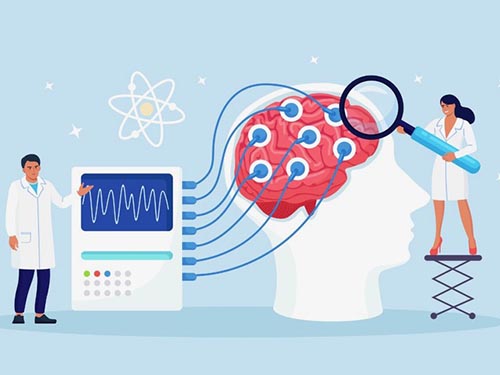
Today I’m going to show you the difference between Neurology and Psychology.
If you are not among the venerable brain scientists who read these articles, I will bet no one has ever come up to you and said: “Do you know the difference between Neurology and Psychology?”
I can see your eyes starting to glaze over already but please stay with me. This very simple bit of information might just turn on a light bulb in your brain to explain why you have spent the last ten years in a fog, or a lifetime feeling like one foot was nailed to the floor while you were going around and around getting nowhere, or even who you are and why you behave in certain ways.
What is the difference between Neurology and Psychology?
According to our handy dictionary:
Neurology:
The branch of medicine or biology that deals with the anatomy, functions, and organic disorders of nerves and the nervous system.
Psychology:
The scientific study of the human mind and its functions, especially in those affecting behavior in a given context.
Did you spot the difference?
You are absolutely right, Neurology is the study of how all the physical components (the hardware) of the brain are wired together (if you think this is interesting, you will love the short video in What I’m Watching below), whereas Psychology is the study of the mental connections (the software) we make every moment of our life.
Very important difference! Hardware glitch? Software bug? A bit of Both?
We have long overlooked the role of the Neurological wiring of the brain in the diagnosing, labeling and treatment of mental disorders and mentally related physical disorders, and in the enhancement of our performance at work, at school or in sports.
Psychological disorders have explained all manner of behaviours or misbehaviours over the last century, most likely because it was easier to try and figure out individual personalities and characteristics than to open up someone’s skull and try to figure out the healthy or unhealthy state of the wiring.
Here is the big AHA! moment:
What if you burst out in anger at the smallest irritation not because your mother put you on a cold potty when you were just a wee lad, but because your impulse timing circuit in your right frontal lobe is running too fast for the rest of your brain, causing the frequent outbursts of anger?
What if your stress and burnout were due to chronic hypervigilance keeping your brain on constant high alert, but you had no practical way of turning the hypervigilance off, or down, resulting in a constant state of anxiety?
What if your ‘addiction’ were due to changes in some of your synapses that are now hijacking your dopamine pleasure circuits and bypassing your ability to use your free will to stop?
What if your inability to deal with negative self-talk throughout your life is just due to part of your brain’s visual system running scary scenarios outside of your conscious awareness?
What if the way you have been processing information needed upgrading but were told that you were stuck with “learning disabilities” that have been holding you back from being the best you can be all your life, pretty well.
What if …
In other words, you may not be entirely responsible for some of your inelegancies (shall we say?) that have been pestering you and everyone else for ages. I’m tempted to call it “No Fault Neurology”. Hmmm…
Did I hear a big sigh of relief?
Neuroscience has come of age

We are very fortunate indeed to live at a time when Neuroscience enables us to reprogram our brain:
- To actually fix the hardware problems (banged your head a few times too many perhaps?) and the software (keep repeating the same old harmful behaviour patterns on automatic?).
- To disconnect the less useful neurons in our brain that keep us physically or mentally stuck and to form the new healthy connections we need to live the life we want.
- To do this rapidly, easily, in the comfort of our own homes, without medication and without trying and hoping and spending an inordinate amount of time or money in the process.
Another time, I will tell you about the many technologies that exist already to improve our results and accelerate our healing.
For now, I encourage you to look at some aspects of your life that could do with a little help and wonder if the inelegancies you notice are actually psychological or if they could be caused by a problem with the wiring, i.e., am I really a bad (insert qualifier of choice, ex: stupid, incompetent, lazy, mean, selfish …) person and need a good kick in the butt to change my life around … or is my brain in need of a little TLC? A bit of both … can’t get my act together because my brain is misfiring? The infamous “vicious circle”.
If you remember how I cleared my eczema in this post, I was dealing with both a neurological disorder (an inherited case of severe atopic dermatitis) and a psychological disorder (high levels of constant stress and anxiety that made my eczema worse). By correcting the psychological symptoms, I was able to bring the neurological disorder under control. And by bringing the neurological disorder under control, I was able to assuage the psychological symptoms.
The brain works that way too. The psychological aspect of a person drives the connections that form the wiring. The wiring, in turn, affects the ease or difficulty the person has to change that psychological aspect.
Does it make a bit more sense when you look at your life?
If you’ve never thought of it this way, I promise you that this little exercise could make a BIG difference to the software (the decisions you make every moment of your life) and the hardware (the wiring that drives and supports your software).
Try this:This game is called “Eyeball Baseball”. Next time you need to figure out something that’s bothering you, stop for a second and play “Eyeball Baseball”.
What you are in effect doing is bringing into your conscious awareness the three major senses (visual, auditory and feeling) that are most responsible for generating emotions and your reality. You are also strengthening the back portion of your brain that is wired for vision (occipital lobes), hearing (temporal lobes) and feelings (parietal lobes). With a bit of “Eyeball Baseball” practice, you will immediately be able to see if you are running a tape in your mind of something you may have seen, heard or done that is outside of your conscious awareness and causing you the discomfort you are experiencing … thus enabling you to effectively stop the tape, change course and rewire the behaviour. |
Let me know how it goes for you.
- Has the idea ever crossed your mind that there had to be something else to explain the mental or physical blocks you have experienced?
- Has your perception of yourself changed after reading this brief explanation?
- How did the Eyeball Baseball go for you? Any new insights?
- Sleep on it, be sure to do an Eye Roll first and see what pops up tomorrow after your brain has had a chance to do the rewiring.
Post your questions or answers below and read what others are saying.
What I’m Watching:
If you’ve ever wondered in a nutshell how all this wiring actually works, you’ll love this short and sweet introduction to Neuropsychology.
InJoy!

Leave a Reply
Thank you Cliff for talking about the difference between neurology and psychology. For years, I thought that my anxiety was due to a fault in my personality and felt guilty because I was unable to control it at times. Meditation and visualization helped alleviate the anxious feelings, although it was temporary. I feel fortunate to have been one of your lab rats and benefited from your guidance and the devices you suggested. Love the Eyeball baseball. Excellent exercise for clarity of mind.
Hey Maryse,
Glad you found the Blog to be useful.
Yes I am going to start talking about useful wellness devices soon.
Hugs, Cliff